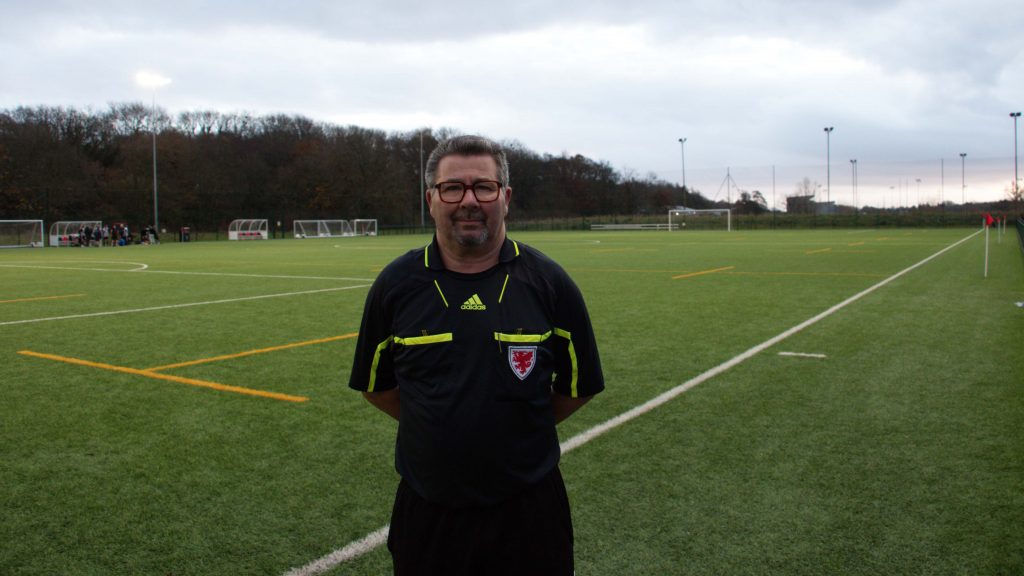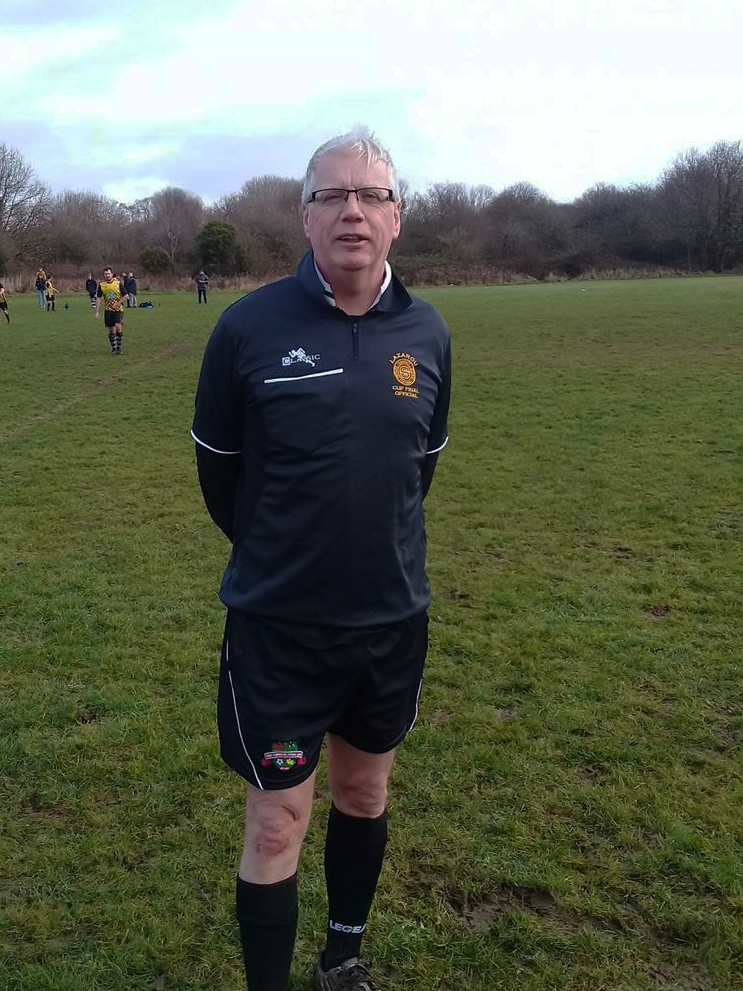More support is needed to help the new generation of match officials with a worsening problem
GRASSROOTS football referees in Cardiff have spoken out about the “horrendous” abuse they receive, from thuggish threats to physical assaults.
Cardiff Referees Society, which has 76 members, boycotted a weekend of matches in November after several matches were abandoned and a referee was allegedly assaulted.
Now, several refs have stepped forward to share their experiences, and their views on what could be done to improve behaviour and support the next generation of match officials.
‘Which one’s your car? I’ll slash all the tyres’
One in four match officials has experienced physical abuse with 88% reporting verbal abuse, according to a survey of 282 match officials by the Football Association of Wales.
Joseph Smart, 57, has been refereeing in Cardiff for 20 years. In that time, he says he’s seen and heard it all.

Now he is further up the ladder he gets more choice over the matches he referees, and knows which teams are likely to cause trouble. But he says he still gets threatened every couple of months, and thinks behaviour on the pitch is the worst it’s ever been.
“I’ve sent a fella off in the past and he hit the card out of my hands. I’ve been pushed and called every name under the sun and heard ‘Which one’s your car? I’ll slash all the tyres’.
“People threaten you, your family, your friends. Even saying ‘I know your son, I’ll sort him out’ or ‘I know your missus’.”
One incident left him particularly shaken. “One fella, three or four years ago, came head to head with me and said ‘Look, I’m gonna kill you’. And if it wasn’t for his manager grabbing him, he was running to have me, saying he was going to kill me.”
Most threats are made in the heat of the moment, and Mr Smart says the vast majority of players are “all mouth”. But even for a seasoned referee with a thick skin, they can take their toll psychologically.
“Sometimes they know about where I live or what car I drive. You do get a good worry, but I don’t tell my missus or kids what’s happening. I don’t want them opening the front door at night or having to look over their shoulder. It’s not fair on them.”
‘You’re on your own’
Referee Lloyd Griffiths, 64, has been involved in the grassroots game in South Wales for over 20 years and is often sent to the more difficult games.
He says referees can feel vulnerable pitching up to a game by themselves, especially for matches that attract bigger crowds.
“You’re on your own, you’ve got 100 people watching who are drunk. It’s a tense, horrible atmosphere. Horrendous abuse no matter what decision you make. And you’re stuck in the middle on your own,” he said.
“There’s no back-up. You’re in the dressing room on your own. Anyone can walk into that dressing room, the door’s open. I’ve known referees threatening to lock themselves in dressing rooms and not come out until the players have gone home.”

Once, a couple of years ago, Mr Griffiths had to abandon a game half an hour in after it was clear the away team had been drinking. The team reacted badly and started to threaten him.
“They threatened to beat me up, saying they’d smash my head in the car park – ‘Get in that car and you’re dead’. Thankfully, the other team surrounded me and stopped a couple of players getting at me. They were running at me trying to start a fight, trying to beat me up. I was pretty shaken,” he said.
After that, he thought twice about carrying on. “You don’t really need the money. Do I really want to do that for £40, to get threatened about having my head kicked in and punched? But I just love football, I just love it.”
Worsening behaviour
The FAW report found that more than 50% of the referees surveyed felt behaviour towards them was getting worse.
Mr Griffiths agrees there has been a deterioration in the last couple of years. He is particularly concerned about the increasing number of players and supporters he sees attending matches who appear to be on drugs – but that’s not all.
“Some of it is inexplicable. Everybody seems to be entitled now. It’s everybody else’s fault, except their own,” he said.
Mr Smart thinks that some of the poor behaviour is driven by what younger players are watching on television.
“If you watch a football match on television, they tell the referee to f*** off – and the kids just take it from that. They think if Rooney can call him that, why can’t I?
“It’s about bringing the youngsters up and teaching them, which the players are not,” he said.

But John Fish, a committee member of Cardiff Referees Society, says it’s not all doom and gloom. Serious incidents do happen, but most games are problem free.
In his 21 years of refereeing, he’s seen some aspects of players’ behaviour improve dramatically, including the reduction of racist abuse.
Referees have also seen improvements in behaviour since the introduction of temporary dismissals, which allow them to send players off for a minimum of 10 minutes if they commit dissent.
More support needed
Mr Fish says the current shortage of referees means that many grassroots games in Cardiff are being played without a qualified referee.
Recruiting new referees is a challenge, and he estimates that about half of newly qualified referees drop out after their first season.
Catrin Asbrey has recently qualified. She says that aggressive behaviour by those on the sidelines can have a big impact early on in a career.
“It can be quite disconcerting. When you’re just starting out, you can lose a lot of confidence,” she said.

She is grateful for the support she has received from other referees, but thinks a more structured approach towards mentoring could help those coming up.
“If you’ve invested in people to do it, it’s how you pull them from there and there are probably a few steps missing,” she said.
Mr Griffiths is involved in a mentoring scheme run by the Vale of Glamorgan Referees Society that supports 15 new referees including four young women. He would like to see the FAW put more funding into initiatives like this.
“We do it all off our own backs. We’re lucky we’ve got three or four lads who will do it for nothing. But if referees get paid for that, there’s an incentive,” he says.
Mr Smart would also like the FAW to check in more frequently with referees, and to send officials to matches to help them understand the extent of abuse that grassroots referees can receive.
What does the FAW say?
The FAW said it had “proactively met with the Cardiff Referees Association and the South Wales Football Association to provide support to match officials”.
A spokesperson said: “The PAWB REF campaign aims to tackle behaviour towards referees and includes the introduction of yellow arm bands for referees under the age of 18, tougher disciplinary sanctions for abuse towards referees and a highly successful Temporary Dismissals trial which saw dissent and abuse reduce by more than 30% across the trial leagues.
“Mentoring of referees in Area Associations increased 45% from 2022/23 to 2023/24, while the Adran Leagues Referee Academy is dedicated to developing women and girls as match officials through mentoring. This has resulted in three times as many women and girl referees.”
The South Wales Football Association were approached for comment but did not respond.



